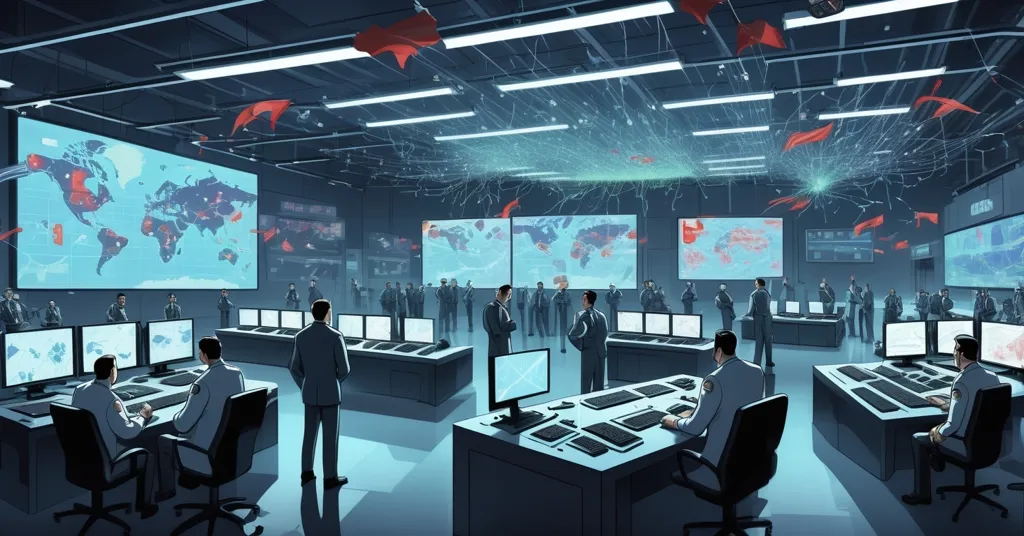Stellantis Battles Chip Shortage: Nexperia Crisis and U.S.-China Fallout Hit Auto Industry

Stellantis Wages War on Chip Crisis as Nexperia Fallout Rocks Auto Industry
Stellantis, a titan in the global automotive arena, has rolled out a daily “war room” to combat a semiconductor shortage that could grind its factories to a halt. This crisis, tied to Dutch chipmaker Nexperia and fueled by a volatile U.S.-China trade conflict, is sending shockwaves through the auto industry, with production cuts already biting and more pain on the horizon.
- Stellantis’ Battle Plan: A daily war room to monitor Nexperia chip shortages and keep factories operational.
- Geopolitical Trigger: Dutch seizure of Nexperia over U.S. security concerns; China retaliates with export bans.
- Industry Fallout: Honda slashes output; Volkswagen, Ford, and others brace for disruptions.
The Nexperia Crisis: A Geopolitical Gut Punch
At the heart of this mess is Nexperia, a Dutch semiconductor firm owned by China’s Wingtech Technology. Semiconductors are the brains of modern vehicles, controlling everything from braking systems to dashboard displays—without them, a car is just a pricey paperweight. The Dutch government, nudged by U.S. national security fears, seized control of Nexperia, citing risks of Chinese influence over critical tech. Why the paranoia? The U.S. is concerned that such ownership could open doors to data breaches or supply chain sabotage in industries vital to global economies. Beijing didn’t take kindly to this move, hitting back with export bans—essentially blocking Nexperia from shipping finished chips abroad, slashing a lifeline for manufacturers worldwide.
This isn’t a one-off spat. It’s the latest chapter in the U.S.-China tech rivalry, echoing past showdowns like the Huawei saga where American sanctions kneecapped a giant over similar espionage worries. Europe, as always, is caught in the crossfire, playing reluctant referee in a game of economic hardball. For the auto sector, still nursing wounds from the COVID-era chip shortages, this is a brutal reminder of how fragile global supply chains are when politics enters the fray. For more on how Stellantis is managing this crisis tied to Nexperia, the situation remains fluid and critical.
Stellantis’ War Room: Fighting for Survival
Stellantis isn’t waiting for diplomats to save the day. Their CEO, Antonio Filosa, put it bluntly:
“We are monitoring day-by-day the chip situation from Nexperia and pushing actions and projects every day to keep our factories running without stoppages.”
This war room isn’t just a dramatic title—it’s a nerve center where teams track every dwindling chip stockpile, hunt for alternative suppliers, and pray assembly lines don’t screech to a halt. It’s a high-stakes operation, because even a day’s delay can cost millions and leave consumers waiting longer for their cars.
But here’s a thought: could a decentralized system, akin to Bitcoin’s trustless ledger, have spared Stellantis this headache? Centralized supply chains, much like centralized finance, are Achilles’ heels waiting to be struck. When one link—be it a government or a single chipmaker—holds too much power, the whole chain risks collapse. It’s a lesson Bitcoiners have been screaming about for years.
Industry-Wide Chaos: From Honda to Ford
Stellantis isn’t the only one sweating. Honda has already felt the sting, cutting production at plants in the U.S., Canada, and Mexico, labeling it an “industrywide” issue. Volkswagen, sitting on a temporary chip cushion, admits disruptions are looming. Ford’s CEO Jim Farley laid out the ticking clock:
“A quick breakthrough is really necessary to avoid fourth-quarter production losses for the entire industry.”
Translation: if diplomacy flops, Ford’s plants might take an unscheduled holiday.
General Motors is also in crisis mode, with CEO Mary Barra stating,
“GM teams are working around the clock with our supply chain partners to minimize possible disruptions.”
Mercedes-Benz CEO Ola Källenius pointed to the root issue:
“This is a politically induced situation, and the only solution lies in the political space, primarily between the United States and China, with Europe caught in the middle.”
Industry voices like Sigrid de Vries of the European Automobile Manufacturers’ Association (ACEA) are sounding dire warnings:
“Assembly line stoppages might only be days away… governments must redouble their efforts to find a diplomatic way out of this critical situation.”
The Motor & Equipment Manufacturers Association (MEMA) agrees, noting that the Nexperia fallout could ripple globally, potentially costing billions in lost production. Remember the 2021 chip shortage? It slashed auto output by an estimated 10 million vehicles worldwide. If this crisis drags on, we could be staring down a sequel nobody wants.
Nexperia and Wingtech: Corporate Counterattack
Meanwhile, Nexperia and Wingtech aren’t rolling over. Nexperia is pleading for exemptions from China’s export bans, while Wingtech is gearing up for a legal brawl to reclaim control. A Wingtech spokesperson declared:
“Restoring full control and ownership rights to the company’s rightful shareholders and management is essential to repair the damage to its reputation and de-escalate international tension.”
Nice sentiment, but begging for leniency while threatening lawsuits hardly screams “de-escalation.” Let’s call it what it is: a corporate tantrum in a geopolitical sandbox.
Legal battles aside, the odds of success are dicey. Historically, when governments intervene on national security grounds, corporate pushback rarely flips the script—just look at Huawei’s ongoing struggles. Without a diplomatic breakthrough, which seems unlikely after a recent fruitless meeting between U.S. President Donald Trump and Chinese President Xi Jinping, Nexperia’s chips might stay locked behind China’s export wall for the foreseeable future.
Centralization’s Curse: A Bitcoin Maximalist’s Take
Zooming out, this isn’t just about cars or chips—it’s about control. The semiconductor supply chain crisis mirrors the vulnerabilities Bitcoin was born to challenge. Just as fiat systems let central banks manipulate money, centralized supply chains let governments and corporations weaponize dependency. For Bitcoin maximalists, this is exhibit A: over-reliance on any single point of failure—whether a chipmaker or a reserve currency—can bring even giants like Stellantis to their knees.
But let’s not ignore the other players. While Bitcoin itself doesn’t fix supply chains, its ethos of cutting out middlemen could inspire parallel innovation in industrial tech. Altcoins and platforms like Ethereum are already hosting decentralized applications (dApps) for logistics—think VeChain or IBM’s Food Trust, which track goods transparently on blockchains. Could such tech one day map semiconductor flows, reducing choke points? It’s a tantalizing idea for crypto OGs who lived through centralized disasters like the 2013 Mt. Gox hack, where trusting one entity burned thousands.
Can Blockchain Solve Supply Chain Dependency?
Before we get too starry-eyed, let’s pump the brakes. Blockchain isn’t a magic fix for a mess like this. Sure, it could boost transparency—imagine a public ledger tracking every chip from factory to car, making export bans harder to enforce without global scrutiny. But scaling that to a multi-trillion-dollar industry? Good luck. Costs are high, interoperability between chains is a nightmare, and governments can still slap restrictions faster than a node syncs. Plus, let’s be real: politicians are more likely to mine drama than Bitcoin before they resolve this quagmire.
Still, the potential is there. If crises like Nexperia’s accelerate the push for decentralized systems, maybe getting burned by centralization is the harsh lesson we need. Bitcoin taught us that much—sometimes, disruption is the only path to resilience. Even if it’s not a direct solution, the ethos of sovereignty and freedom ties directly into why supply chain tech needs a radical rethink.
Key Questions and Takeaways
- What triggered the chip shortage with Nexperia?
The Dutch government took over Nexperia due to U.S. national security concerns over its Chinese ownership by Wingtech Technology, leading China to impose export bans on Nexperia’s chips, disrupting global supply. - How is Stellantis responding to this semiconductor crisis?
They’ve launched a daily war room to monitor the Nexperia situation, secure alternative supplies, and prevent factory shutdowns at all costs. - What’s the impact on the wider automotive industry?
Honda has cut production across North America, while Volkswagen, Ford, GM, and Mercedes-Benz face looming disruptions, with assembly line stoppages potentially just days away without a resolution. - Is a quick fix to this U.S.-China conflict likely?
Not at the moment—recent talks between U.S. and Chinese leaders yielded no progress, leaving automakers and suppliers in a precarious limbo. - Could blockchain or decentralized tech prevent future supply chain crises?
It’s a long shot for now, but blockchain’s transparency could reduce dependency on centralized choke points, though scaling and geopolitical barriers remain massive hurdles.
The Road Ahead: Adaptation or Collapse
As this saga drags on, automakers like Stellantis are racing against time, scouring for backup suppliers while hoping for a diplomatic miracle. But let’s not kid ourselves—this isn’t a minor hiccup; it’s a glaring warning that the semiconductor supply chain, much like legacy finance, is overdue for a shake-up. Whether through decentralized tech or sheer survival instinct, adaptation is the only option before the next geopolitical uppercut lands. For now, Stellantis’ war room is in full combat mode, and the stakes for the auto industry—and the broader fight for tech sovereignty—couldn’t be higher.



